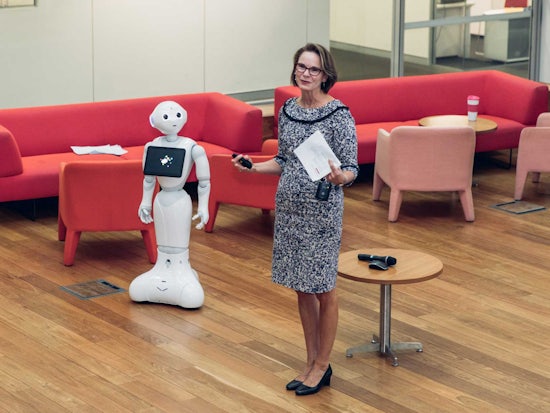Is virtual reality the future of aged care?
In a major research collaboration between the Queensland University of Technology and the ageing and aged care industry, experts are working to reconceptualise ageing and how we view it.

Professor Laurie Buys at the Senior Living Innovation launch (Photo: Nicholas Sterkenberg)
Emerging technologies such as robotics, automation, and visually interactive design, often associated only with youth, might be the best way to address Australia’s ageing community into the future
“Virtual reality, new services, multi-generational communal living and other innovative accommodation models – this is the future of senior living and the revolution has already begun,” says Professor Laurie Buys, a QUT researcher from the Institute of Future Environments at the recent launch of Senior Living Innovation.
The World Health Organisation advocates active ageing, identifying health, participation and security as three key factors that enhance quality of life, and researchers from Senior Living Innovation have taken that on board.
“Ultimately, we want to facilitate and maintain community engagement and create great living environments for older Australians,” says Professor Buys.
Senior Living Innovation will access world-leading researchers in a range of disciplines, exploring what roles technology and innovation will play in the care of the next generation of seniors, using three individual research projects to gather information.
The results of the projects in community engagement, social media data analysis, and online community forums, will form the base for new ways of providing quality, personalised services in the future.
This kind of research is becoming increasingly important as Australia’s population ages, as the number of people requiring access to aged care will more than double by 2031, and by 2050, one in four Australians will be over 65.
Facing an uncertain future and increasing demand, innovation may be the only way forward for the aged care industry.
Professor Buys says while society views ageing as ‘a problem to be managed,’ the Baby Boomer generation will expect to lead an active life and maintain their contribution and value within their community into retirement.
“Baby Boomers are ageing, but they aren’t getting ‘old,’” she says.
“The industry has an opportunity to challenge traditional stereotypes and assumptions of ageing and develop new business models that reinvent the ageing experience and support health and wellbeing through all life stages.”






















